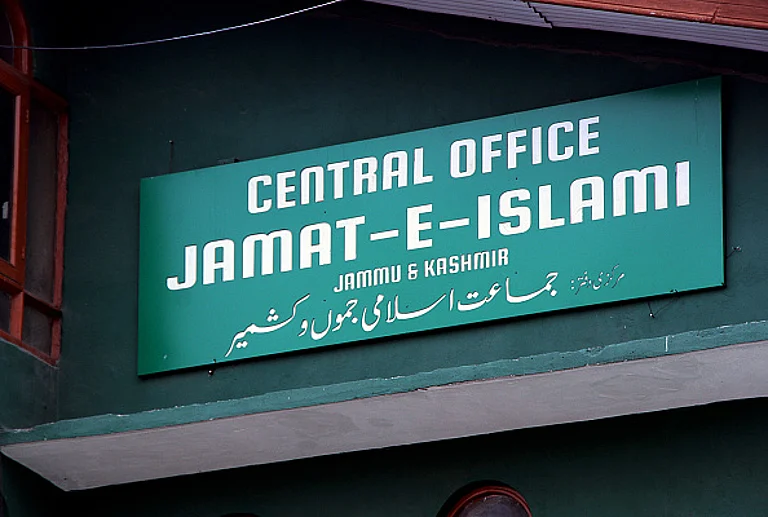When the results of the parliamentary elections were announced, Engineer Rashid's victory in the north Kashmir constituency of Baramulla came as a surprise to political leaders like National Conference leader Omar Abdullah. Rashid, who was then in Tihar jail on Unlawful Activities (Prevention) Act charges, entered the contest very late. But he managed to beat Abdullah and Peoples Conference leader Sajad Lone by a huge margin. Rashid got nearly 470,000 votes, while Abdullah trailed at around 268,000 votes and Lone got about 173,000 votes. The margin of victory seemed to have shocked Omar and Lone so much that three months after the defeat, during campaigning for the Assembly elections, Omar refused to call him Engineer saying he is only diploma holder, and Lone went further saying articles appearing in Rashid's name were by ghost writers.
Did Kashmir's ‘Islamist’ Voters Turn Secular Nationalists In Three Months?
If Engineer Rashid's win in June was indeed an Islamist triumph, then Omar Abdullah should be a great influential secular preacher who has been able convert people en masse towards his party's secular agenda in three months
Soon after the defeat in the parliamentary polls, Omar Abdullah shared an article characterising Rashid's win as an Islamist triumph. Omar on June 6 tweeted a paragraph from an article which read: “Rashid’s victory, without doubt, will empower secessionists, and give Kashmir’s defeated Islamist movement a renewed sense of hope. Efforts to draw secessionism back into electoral politics led New Delhi to support the rise of the People’s Democratic Party, and its alliance with the BJP. That, however, ended up empowering violent secessionists, not mainstreaming them—a warning of the unpredictable outcomes of trying to manipulate politics.”
PDP leader Mehbooba Mufti's argument, however, was that people had replied to New Delhi’s policy in Kashmir by making Rashid win in north Kashmir.
Three months later, perspectives are different.
On October 8, when the Assembly results were announced, Rashid could retain only one seat out of 16 Assembly segments of north Kashmir.
In the 35 seats contested by his party across the state, he was decisively defeated in 34. The only winner was Rashid’s brother in the Langate constituency, which had previously been Rashid's own constituency. Rashid had been winning there since he began contesting elections in 2008.
During the campaigning, Rashid had referred to the death of Altaf Fantoosh, the late separatist leader Syed Ali Geelani's son-in-law, who had been imprisoned alongside him. He also spoke about other separatist figures like Assiya Andrabi, the leader of banned Dukhtarani Milat, and shared his own experiences of suffering during his five years in Tihar Jail.
Despite his lofty rhetoric, Rashid's Awami Ithad Party underperformed.
In contrast, we saw the National Conference emerging as the largest party, winning 42 seats in the 90-member Assembly. The party won 35 seats in Kashmir and seven seats in Jammu’s Ramban, Poonch, Rajouri and Reasi districts. This indicates that Rashid’s victory, without doubt, didn’t empower secessionists, and didn’t give “Kashmir’s defeated Islamist movement a renewed sense of hope.” It only empowered the National Conference, giving the party a decisive mandate like that of 1977 when Sheikh Mohammad Abdullah was leading the party. The party has got a mandate from all parts of the Valley and some parts of Jammu. If the party had campaigned on its own in Jammu, without the Congress, it would have performed better than Congress.

If Rashid's win in June was indeed an Islamist triumph, then Omar Abdullah should be a great influential secular preacher who has been able convert people en masse towards his party's secular agenda in three months. Sometimes we are quick to come to judgments on Kashmir and make ourselves believe that we solved a great riddle. But Kashmir is quick and silent in its surprises.
In Kulgam, people have been electing a CPI-M candidate for years. This time, the contest in Kulgam was on ideological lines with Jamaat-e-Islami-backed candidate Sayar Ahmad Reshi saying that godless communists have been ruling Kulgam constituency for too long and that it was time to replace them. Reshi lost by 7,000 votes.
One of the main arguments of Omar Abdullah was that if people give a fragmented mandate, BJP along with its like-minded parties would ratify what happened on August 5, 2019. Maybe voting happened on these lines. When Jammu voting for the BJP is not seen as being on religious lines, Kashmiris voting for National Conference is also not a religious vote. Remember the National Conference has representation in all regions and it draws leaders and cadres from all religions and is a known secular party.
When people in north Kashmir voted for Rashid in the parliamentary elections, his son had generated a wave of sympathy for his incarcerated father, who had served as MLA. It was a symbolic and sympathetic vote. Out of jail, Rashid was like any other leader. It did not help that Rashid was projected as a BJP mole during the latest campaign.
Rashid himself might be surprised that while a large number of people came to his rallies where he was narrating his stories from Tihar, it didn’t translate into votes. In these elections, Kashmiris turned up in large numbers for all rallies; from Apni Party chief Altaf Bukhari to independent candidate Usmaan Majid, all drew substantial crowds. However, voters ultimately favoured the National Conference.
The people of Kashmir have carried a heavy burden for many years now. In their silence, they hoped to lighten this load by transferring responsibility to someone.
It seems they found Rashid’s shoulders too weak to carry the burden of addressing critical issues like Article 370, the restoration of statehood, unemployment, fears of demographic change, and concerns about land and identity. Now, after the elections, Kashmiris are seen watching international cricket matches at the Bakshi Stadium, cheering for Chris Gayle. They feel a sense of relief, believing it is now Omar Abdullah's responsibility to tackle all other issues. The burden on Omar Abdullah is no small one.
Tags


